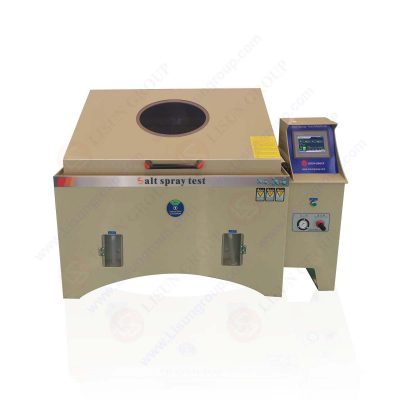

Introduction
The salt spray machine plays a critical role in the evaluation of material resistance to corrosion, particularly in industrial applications. One of the industry-standard tools for this purpose is the LISUN YWX/Q-010 Salt Spray Test Chamber, which enables precise testing under controlled conditions. This article provides a comprehensive look at how salt spray machines work, their applications, and a detailed review of the LISUN YWX/Q-010 Salt Spray Test Chamber.
What is a Salt Spray Machine?
A salt spray machine, also known as a salt fog chamber, is designed to simulate harsh, corrosive environments to assess the durability of materials and coatings. These machines are commonly used to test metals, coatings, and other materials for resistance to salt-induced corrosion.
The Importance of Salt Spray Testing
Corrosion is a major concern in industries such as automotive, electronics, and marine engineering, where products are exposed to salty or humid environments. Salt spray testing is one of the most widely used methods to predict how materials and coatings will perform in these environments. The key advantage of using a salt spray machine is its ability to simulate decades of exposure within days or weeks.
How Salt Spray Machines Work
A salt spray machine like the LISUN YWX/Q-010 Salt Spray Test Chamber works by spraying a saline solution (typically a mix of water and sodium chloride) onto the sample materials. The chamber controls the temperature, humidity, and concentration of the solution, maintaining constant conditions that mimic corrosive environments.
Key components of a salt spray machine include:
• Control system: Monitors and adjusts conditions like temperature and humidity.
• Spray system: Disperses the saline solution as a fine mist.
• Sample racks: Holds the materials being tested in place to ensure uniform exposure.
LISUN YWX/Q-010 Salt Spray Test Chamber Overview
The LISUN YWX/Q-010 Salt Spray Test Chamber is a highly reliable and widely used model for salt spray corrosion tests. It complies with several international standards such as ASTM B117, ISO9227, and GB/T 2423.17. The chamber is equipped with a variety of advanced features that enhance its precision and ease of use.
Some notable features of the LISUN YWX/Q-010 include:
• Corrosion-resistant material: The interior is made from corrosion-resistant polypropylene (PP) to ensure long-term durability.
• Automatic control system: Provides precise regulation of temperature and spray time.
• Uniform spray distribution: Ensures consistent exposure across all samples.
• High-performance air compressor: Supplies a stable flow of air to the spray nozzle, ensuring a fine and consistent mist.
Applications of Salt Spray Machines
Salt spray machines are essential for assessing the corrosion resistance of materials used in various industries. Some key applications include:
• Automotive industry: Testing the corrosion resistance of car components such as body panels, frames, and electrical connectors.
• Marine industry: Assessing how materials used in shipbuilding and offshore platforms withstand the corrosive effects of seawater.
• Electronics industry: Evaluating the performance of coatings and enclosures that protect sensitive electronic components.
YWX/Q-010_Salt Spray Test Machine
Salt Spray Test Standards
Various standards govern salt spray testing, and the LISUN YWX/Q-010 Salt Spray Test Chamber complies with the following:
• ASTM B117: The most widely recognized standard for salt spray testing, used to assess the corrosion resistance of paints, coatings, and metals.
• ISO 9227: Specifies methods for neutral salt spray tests (NSS), acetic acid salt spray tests (AASS), and copper-accelerated acetic acid salt spray tests (CASS).
Test Procedures and Data Analysis
The testing process involves several critical steps:
• Preparation of the sample: Cleaning and drying the samples before placing them in the chamber.
• Saline solution preparation: The solution typically contains 5% sodium chloride and is sprayed at a constant rate.
• Test duration: Depending on the material, the test can last anywhere from 24 hours to several weeks.
• Post-test evaluation: After the test, the samples are analyzed for signs of corrosion, such as pitting, blistering, or coating degradation.
Table 1: Sample Salt Spray Test Results Using LISUN YWX/Q-010
Material
Coating Type
Test Duration (hours)
Corrosion Observed
Steel
Zinc coating
48
Minor pitting
Aluminum
Anodized
72
No corrosion
Copper
Painted
24
Severe blistering
Plastic (ABS)
No coating
120
No corrosion
Advantages of Using LISUN YWX/Q-010 Salt Spray Machine
The LISUN YWX/Q-010 Salt Spray Test Chamber offers several advantages over other models:
• Precise environmental control: Ensures accurate and repeatable results.
• Durability and reliability: The corrosion-resistant construction ensures a long service life.
• Compliance with international standards: Meets all major standards, including ASTM and ISO, making it suitable for a wide range of industries.
Conclusion
The salt spray machine, particularly the LISUN YWX/Q-010 Salt Spray Test Chamber, is an invaluable tool for assessing the corrosion resistance of materials in various industries. By simulating corrosive environments, companies can predict the long-term performance of materials and coatings, ensuring product reliability and safety. Whether for automotive, marine, or electronics applications, salt spray machines are critical for maintaining high-quality standards in production and research. https://www.lisungroup.com/news/technology-news/understanding-the-salt-spray-machine-for-corrosion-testing-a-detailed-analysis-using-lisun-ywx-q-010-salt-spray-test-chamber.html
.jpg)
Comments
Post a Comment